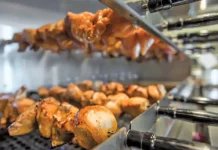
Article contributed by Joseph Tangredi, Ellenoff Grossman & Schole LLP
The restaurant industry has drastically been reshaped due to the COVID-19 pandemic. At the onset of the pandemic some restaurants sadly closed and never reopened.
Those that managed to stay open had to quickly adapt by figuring out how to survive with takeout and delivery services only, while simultaneously ensuring that their operations were in compliance with federal and state health and safety regulations, and newly enacted labor and employment legislation.
Now, as the restaurant industry is opening its doors to the public again, certain recent innovations and practices that have become mainstays in the industry during the pandemic may endure beyond the COVID-19 era and into the new normal. Such changes, some of which could be permanent, should be embraced by the industry as they could lead to increased efficiency and profitability for some restaurants.
One of the most readily apparent additions to restaurants during the pandemic was the implementation of various technologies that modernize the dining experience. For instance, many establishments opted for contactless ordering or digital menus in place of traditional paper or plastic menus.
Patrons are now able to scan a QR code, go to a restaurant’s website, or even use a tablet at the table to view a menu. Seemingly gone are the days where waiters hand guests several reusable menus during a meal, all of which needed to be sanitized after each use or at the end of the day, if at all.
The alternative were paper menus that had to be thrown out after each day and reprinted for the following day. Restaurants can, and many have made, all their menu offerings accessible online. With this change, restaurants are able to seamlessly change prices, highlight specials, and add or remove items at any time they choose to.
In addition, contactless or tableside ordering through mobile devices or tablets are advancements that have shown too many benefits for restaurants to do away with in the foreseeable future. A customer’s ability to view a menu electronically and order their food and drinks themselves, without the involvement of a server, could also mean increased cost savings and efficiency for restaurants.
Customers who have the whole menu at their fingertips can order at any time and do not need a server to walk to their table, take their order, and then bring the order back to the kitchen. Restaurants can run a leaner and more profitable operation with less staffing of servers and bussers, and potentially avoid the labor shortages that have plagued the hospitality industry for some time.
This self-ordering process also minimizes the chance for mistakes on behalf of employees which could lead to less waste and more profit, e.g. incorrectly taken orders and discarding unused food items, and reduced legal liability, e.g. requiring that customers clearly state any allergies they may have before being served.
Lastly, it may open up the possibility for a more interactive experience with the customer. For example, ordering via a mobile device may prompt patrons to take surveys at the end of their meal to provide feedback about their dining experience and provide a direct link to Yelp or TripAdvisor to rate their meal.
Restaurants should also consider maintaining their outdoor space for their customers as a permanent offering post-pandemic. Although restaurants in New York City are now free to reopen indoor dining at 100% capacity, albeit with several restrictions, certain restaurants who previously operated exclusively indoors have been able to service an increased number of patrons, and a new kind of patron, with their outdoor/street-side seating which has resulted in additional ways to generate revenue.
Other than the fact that outdoor dining may still be preferable to customers who want the open air space due to COVID-19 concerns, the elaborate outdoor spaces that restaurants have created, which include their purchase of extra tables, chairs, bar stools, outdoor heaters, and umbrellas, have come at great cost to businesses who should not forego that investment in such a short time.
This is especially true considering the warm summer months are here which will inevitably lead to a more consistent influx of customers that are excited to get out and enjoy themselves as more and more of the public receive their vaccinations. The lingering question in the industry is whether local governments will continue to allow hospitality establishments to operate outdoors in those newly constructed spaces.
Fortunately, that seems to be the case. New York City Mayor Bill de Blasio already committed that his Open Restaurants program, which allowed restaurants to establish outdoor dining in New York City, will be a permanent year-round initiative. Certain candidates for the upcoming New York City mayoral race have also committed to maintaining Mayor de Blasio’s plan of year-round outdoor dining.
In fact, one of the front-runners in the mayoral race, Andrew Yang, has pledged in his campaign to update the city code to include Mayor de Blasio’s program. Other candidates such as Eric Adams, Shaun Donovan, Kathryn Garcia, and Diane Morales also have supported the idea of maintaining outdoor dining.
The COVID-19 pandemic has forced the restaurant industry to change the way it operates. While government restrictions and forced closures threatened the survival of the industry as a whole, those same restrictions have altered the mindset and preferences of the restaurant patron.
Restaurants have responded, and should embrace this new normal, as what originally seemed to be impediments to success, may end up being changes that lead to increased efficiency, and more importantly a much needed boost in profitability for restaurants in the foreseeable future.

Joseph Tangredi is an Associate at Ellenoff Grossman & Schole LLP in the firm’s Labor & Employment practice group. Joseph specializes in advising clients in the hospitality industry on labor and employment legal matters, and also defends his clients in labor arbitrations before the NLRB, and against wage/hour and discrimination claims brought in federal and state courts.
Joseph Tangredi can be reached at JTangredi@egsllp.com or via phone at 212-370-1300.























